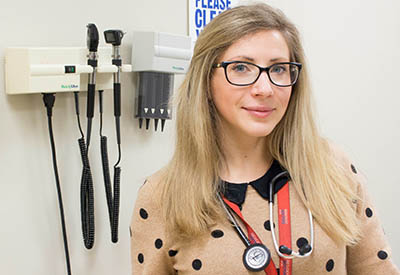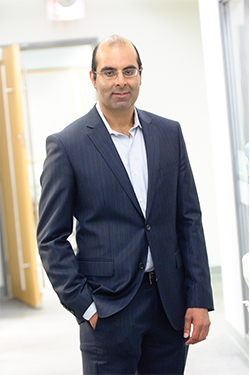
Kateryna Vostretsova is one of 43 residents recently matched to UBC subspecialty residency positions as part of the annual Canadian Resident Matching Service Medicine Subspecialty Match.
The sound of the child struggling for air and the fear in the young mother’s eyes are what Kateryna Vostretsova remembers most about her first emergency case.
The child, a young girl of no more than four, had been rushed to the hospital with anaphylaxis – an allergic reaction so severe that, if left untreated for long, can have life-threatening consequences.
“The child was in such distress,” recalls Dr. Vostretsova, who, at the time of the event, was a third-year UBC medical student on her first rural rotation in Dawson Creek in northern B.C.
Working alongside an emergency doctor and team of healthcare providers, Dr. Vostretsova played a pivotal part in managing the crisis, helping administer epinephrine to ease, and ultimately halt the symptoms of the girl’s allergic reaction.
And while many urgent medical situations and patients have shaped Dr. Vostretsova’s journey as a young physician, it was her very first emergency case that has continued to influence her desired destination.
“It was in that moment that I decided I wanted to explore a specialty where I would be able to understand these conditions and educate parents and the public about preventing such life-threatening events,” she says.
Today, Dr. Vostretsova, now a third-year internal medicine resident at UBC, is well on her way to doing just that.
In early November, Dr. Vostretsova was one of 43 residents matched to UBC subspecialty residency positions as part of the annual Canadian Resident Matching Service (CaRMS) Medicine Subspecialty Match (MSM), designed for internal medicine residents looking to enter subspecialty training programs across the country.
These newly-matched residents will join a number of subspecialty programs at UBC — including medical oncology, general internal medicine, and rheumatology. Over the course of their training, they’ll gain specialized skills and expertise to help address specific health care needs associated with British Columbia’s growing population.
For Dr. Vostretsova — who will be joining UBC’s Allergy and Immunology residency program — the next two years will see her working in various outpatient clinics and completing rotations in hospitals, including BC Children’s and St. Paul’s.
“Internal medicine is fascinating, and I’m really excited about specializing in allergy and immunology because I’ll have the opportunity to help improve the quality of life for people — both young and old — who are struggling with everything from allergies and asthma through to more severe immunodeficiency disorders,” says Dr. Vostretsova.
Of the 43 available subspecialty positions at UBC, 100 per cent were filled in the first round.

Ravi Sidhu, Associate Dean of Postgraduate Medical Education
“These strong match results are a testament to the strength of postgraduate medical education here at UBC,” says Dr. Ravi Sidhu, Associate Dean of Postgraduate Medical Education. “The supportive learning environment provided by our faculty, program directors and residents, and the breadth of clinical exposure make UBC’s programs highly sought after.”
“As subspecialist residents, these trainees will continue to hone their skills, while supporting patients in health care settings across the province,” adds Dr. Sidhu.
Of the 43 UBC subspecialty positions, nearly two thirds were filled by current UBC residents. In addition, over 70 percent of UBC residents who matched to UBC subspecialty programs also completed their medical school training at UBC.
“It’s very encouraging to see many of our medical students continue their path to residency right here in B.C.,” says Dr. Sidhu.
Dr. Vostretsova, who grew up in Vancouver and completed her medical school at UBC, is among this group of home-grown doctors.
Down the road, Dr. Vostretsova says she’s excited about the prospect of balancing her clinical work with education and research.
“It’s so important to incorporate advancements in research into your daily practice,” says Dr. Vostretsova, who is currently pursuing a research project exploring the effect of climate change on allergic respiratory conditions.
And though Dr. Vostretsova now has her sights set firmly on the road ahead — she knows that the memory her first emergency case, at the hospital ward in Dawson Creek, will always be with her, pushing her forward and shaping her journey long into the future.
Over the past decade, UBC’s expansion and distribution of medical education programs have significantly increased the number of physicians trained in British Columbia. Today, over 1,400 medical trainees are pursuing postgraduate medical education at more than 100 sites across the province. UBC’s Family Medicine Residency Program — now the largest in Canada — accounts for the largest number (nearly half) of UBC residency positions.